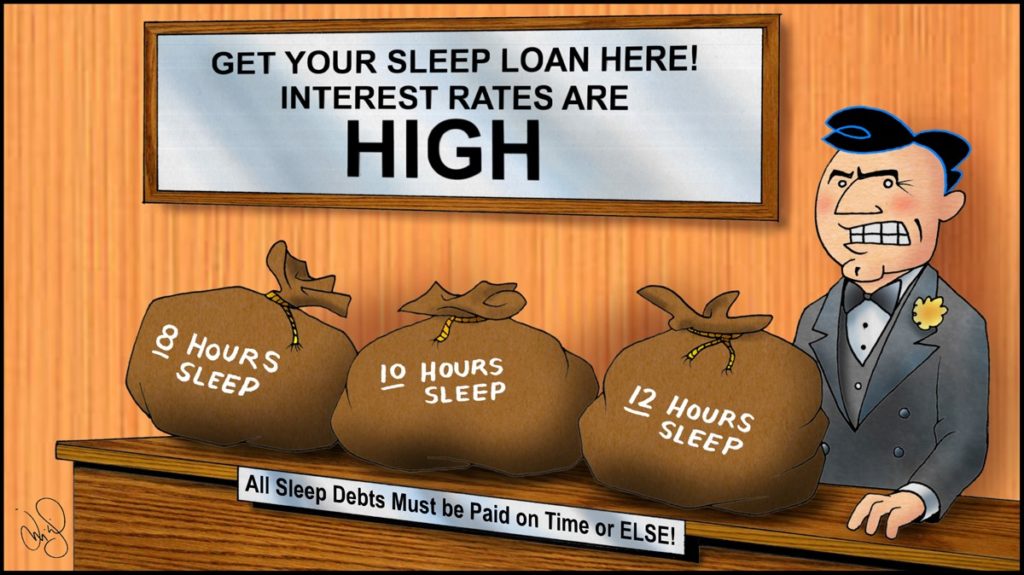Have you read the book or seen the movie “The Big Short?” It is about a few money managers who “shorted” or bet against the housing market during the subprime mortgage crisis. They bet that people would not be able to pay their high interest mortgage debts and defaults would occur. They were correct and gained enormous profits. Many people lost homes and investments. The government passed a bailout to save the banks and the overall economy. So the American taxpayers paid the debts. All debts must be repaid.
There are people who “short” or bet that they do not need adequate sleep. They are willing to miss hours of sleep in order to do something they consider more valuable with that time. A sleep debt is created, but there is no agency to pay our sleep debt and there are no profits. The debt grows every time we miss the amount of total sleep we need every 24 hours. Each of us must repay our own debt or pay the consequences. All debts must be repaid.
Sleep debt is the difference between the amounts of sleep we should be getting and the amount we actually get. It increases each time we get less sleep than we need. Dave Ramsey, a financial advisor, says, “You must gain control over your money or the lack of it will forever control you.” Substitute the word “sleep’ in his sentence and make it an affirmation: I must gain control over my sleep or the lack of it will forever
control me.
In The Harvard Medical School Guide to a Good Night’s Sleep, (a good read) Dr. Lawrence J. Epstein offers the following advice about sleep debt:
- Settle short-term sleep debt – If you missed eight hours of sleep over four or five nights, add three or four extra sleep hours on the weekend and an extra hour per night the following week until the debt is repaid.
- Address a long-term sleep debt – Take a vacation for sleep and stress reduction and do not schedule multiple events. Just sleep every night and wake up naturally.
- Do not backslide into a new sleep debt cycle – Stop borrowing time that should be used for sleep. A vicious cycle of sleep deprivation eventually takes a toll on body, mind, and soul. Constant debt can affect our health and well-being.
Sunday, March 13 is when Daylight Savings Time (DST) begins in most USA states and in most Canadian provinces. “Springing forward” means we lose one hour of sleep. Studies show that the number of traffic accidents and the number of heart attacks increase on the Monday after DST begins. This is an indicator that people did not plan for the one-hour of “lost time” by going to bed earlier or taking a nap on Sunday afternoon. It is relatively easy to set our clocks forward by one hour, but our circadian rhythm takes a few days to adjust.
We can ease our way into the DST change by sleeping 30 minutes longer for the two or three days before DST begins. On the Saturday prior to DST, seek to get at least eight hours of sleep, exercise around noon, and go to bed one hour earlier than usual. Exercise can help advance the body clock.
On Sunday, get up at your usual time. Avoid the temptation to sleep late, since it just makes it more difficult to adjust to DST. Take a morning walk and spend at least one hour outside since sunshine also advances the body clock. Take a short nap in the afternoon. Go to bed in your ideal sleep environment earlier than usual.
On Monday, get up at your usual time and follow your usual routine. On your commute to work, watch out for the people who did not prepare for the beginning of DST. Use the safe driving techniques you always do and watch out for drowsy drivers.




